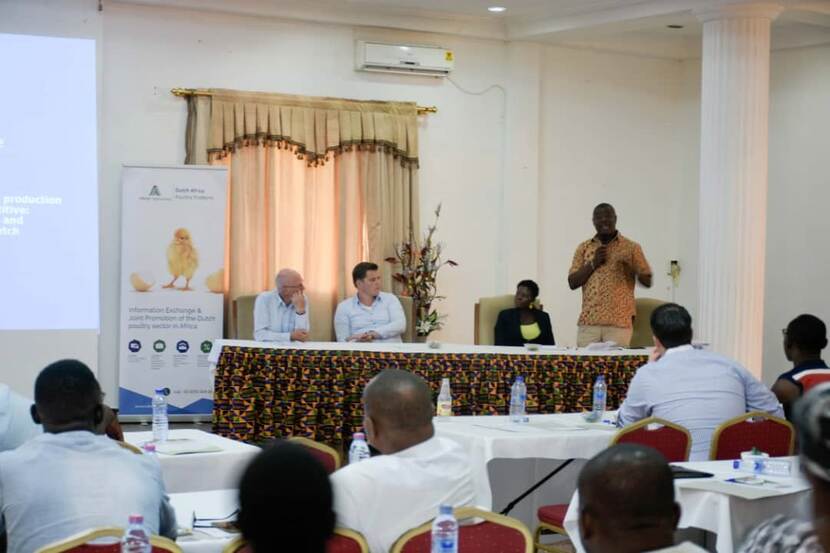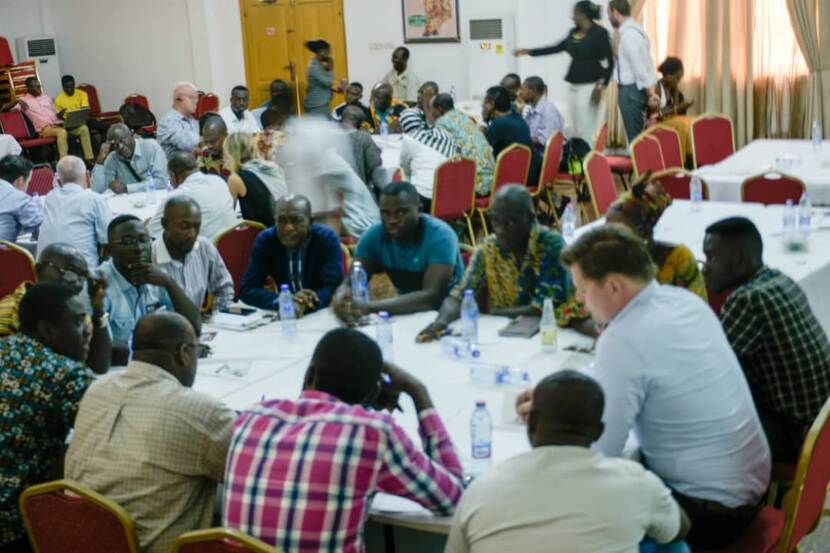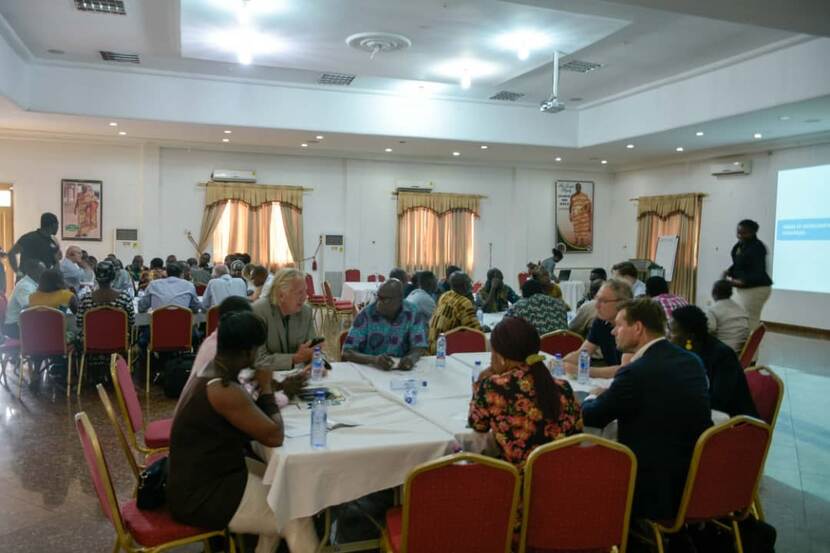Ghana-Dutch Poultry Seminar
The poultry industry in Ghana is predicted to display promising growth in the next few years. Over the years, there has been an increase of an annual average of about 6% in consumption of chicken. Chicken also remains one of the most important sources of protein to Ghanaians with a national demand of 370,000MT as reported in 2018. This demand has not matched local production leading to increase in chicken imports over the last 10 years with huge import bill. Despite the availability of highly skilled labour and conducive climatic conditions for poultry production, the country has not been able to produce competitively to meet local demand.
The Netherlands is a frontrunner in efficient poultry production systems and offers opportunities to trade and invest its knowledge and technologies in order to develop a competitive Ghanaian Poultry sector.
As part of identifying the trade and investment opportunities in Ghana’s poultry sector for companies in the Netherlands, the Embassy of the Kingdom of the Netherlands (EKN) organized a seminar in Kumasi on 3rd July, 2019 with the theme “Making Ghana’s poultry production sustainable and competitive: Opportunities for Trade and Investment with the Dutch”.

Relevance of the Seminar
The Seminar brought together relevant stakeholders in the poultry sector, particularly, poultry farmers in the Greater Accra, Ashanti and Brong Ahafo regions. At the government level, the Minister of State in charge of livestock was present. Technical support was provided by the Ghana Poultry Project.
The seminar created a forum where the challenges, opportunities and the way forward were discussed by the major actors in the sector. It also offered actors in the poultry sector to get to know the funding opportunities available at the Embassy of the Kingdom of the Netherlands and how they can access it.

Issues/Challenges raised
The SWOT analysis carried out by the Ghana Poultry Project along the poultry value chain shows that at the input level, there is adequate VET input supplies with experienced input dealers. At the production level there exists a strong technical know-how, high installed production capacity and the superior taste and freshness of local poultry products. The strengths at the processing and marketing level are the tastier and healthier chicken products which are preferred by the local market.
Despite these strengths, the sector is faced with many weaknesses including the quality of vaccines, a nascent hatchery sector, inability of local feed mills to meet local demand due to inadequate maize and soybean production locally. At the production level, the major weaknesses include; inadequate bio-security systems, self-on-farm feed production, inefficient production systems, especially in feed wastage, abuse of antibiotics and poor linkages between input suppliers and marketers. High cost of meeting food safety certification standards, high cost of local poultry production and inability to meet consumer preference are some of the challenges at the processing and marketing level. There is also absence of processing facilities, cold storage and appropriate transport facilities to support poultry processing.
Combining the findings above, speeches from invited guests, group work from participants and other presentations, the major challenges of the poultry sector can be summarized as follows;
Production level
- Low quality day-old chicks due to poor quality local hatcheries and lack of regulations to govern the sector
- High cost of feed production as a result of inadequate local raw material production (soybean and maize)
- Low quality of VET drugs and abuse of antibiotics
- Inadequate bio-security systems
- Unavailability of testing laboratories to test both locally produced and imported poultry feed
- Absence of appropriate transport facilities to transport day-old chicks (locally produced and imported) to local farms
- High cost of production due to production inefficiencies, especially in the area of feed waste.
Processing and marketing
- Very limited poultry products on the market (chicken meat)
- Limited appropriate cold chain facilities and transport facilities
- High cost of meeting food safety certification standards
- Limited processing facilities
- Competition from imported poultry products
Opportunities for Ghana-NL trade and investment
The increasing local demand for chicken and chicken products coupled with the challenges identified above presents vast trade and investment opportunities between Ghana and the Netherlands. At the input level, there is high demand for poultry vaccines and feed. Poultry vaccines are not produced locally except the ND I2 vaccine produced to combat New Castle Disease; the rest are all imported to Ghana. This presents an opportunity for Dutch companies to invest in manufacturing of poultry vaccines. The over 70 million birds in Ghana provides a huge opportunity to invest in poultry vaccines production locally. There is also a need for huge investment opportunity in hatcheries and collaborations with existing hatcheries with technical support. The quality of day-old chicks hatched in Ghana is low, so most poultry farmers prefer to buy imported day-old chicks, especially layer day-old chicks. In 2016 alone, Ghana imported 784,917 broiler day-old chicks and 3,963,705 layer day-old chicks. Currently, there is limited regulation of local hatcheries. There are also inadequate testing facilities for feed making it difficult for farmers to test locally produced feed. There is also the need for investment in testing facilities for carcass and water due to the low density for such facilities.
At the production level, farmers have very limited knowledge in feed formulation making it difficult to optimize their formulations. More than 80% of poultry farmers in Ghana produce their own feed because of the cost of feed on the market. Feed cost constitutes about 60%-70% of total cost of production, making the unit cost per live bird very high. Dutch companies can partner with their Ghanaian counterparts to run short courses for poultry farmers in the areas of bio-security systems, feed formulation, use of veterinary medicines, administering of vaccines, etc. Dutch firms can invest in feed production using their advanced knowledge, standards and economies scale to reduce the feed costs to make the cost of local poultry production lower.
At the processing and marketing level, opportunity exists for processing facilities, value addition to poultry meat, packaging materials, cold chain facilities (transport, storage, etc,).
Available trade and investment opportunities in the sector are summarized below.

Production
- Hatcheries to produce quality day old chicks
- Testing facilities to test the quality of locally produced and imported feed, water and carcass
- Technology transfer on alternative raw materials for feed production
- Knowledge transfer in feed formulation and feed optimization
- Manufacture of poultry vaccines and drugs locally
- Investment in poultry feed mills
- Transport facilities to carry day-old chicks from hatcheries/imports to poultry farms
- Poultry academies
- Commercial maize and soybeans farms
- Large scale broiler production through outgrower schemes
Processing and Marketing
- Chicken processing facilities
- Value-added chicken products
- Development of outgrower schemes (for broilers)
- Food safety laboratories
- Cold chain facilities
- Packaging materials
Looking forward
It was also realized that, partnerships could be brokered between organizations or companies that are (potential) actors in the poultry value chain. For instance Pharmaceutical companies in Ghana can partner Dutch Pharmaceutical companies to produce veterinary drugs in Ghana. This is same for poultry feed, cold chain facilities, etc. What is required is for them to be convinced that it is profitable to invest in these areas. Future seminars will be widened in scope to cover other potential business partners.
Next steps
Following this seminar, plans are being made on how best the embassy could facilitate a Poultry Impact Cluster or SDGP between some Ghanaian and Dutch companies.